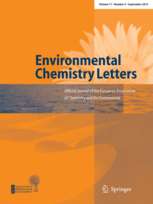To curb China's haze and air pollution, use water

A new idea to cut back on air pollution: spray water into the atmosphere from sprinklers atop tall buildings and towers, similar to watering a garden. This suggestion comes from Shaocai Yu of Zhejiang University in China, and North Carolina State University in the US. In an article published in Springer's journal Environmental Chemistry Letters, Yu suggests this course of action as a novel approach to help curb the severe air pollution and heavy haze that is experienced in many Chinese cities, as well as others around the world.
Over the past 30 years the megacities of China have suffered from air pollution because of the nation's decades-long burst of economic and industrial growth. Moreover, air pollution of this nature is not easy to manage, because the pollution typically comes from a variety of sources such as coal-based energy, traffic and heating in the megacities themselves.
But in a new article, Yu proposes spraying water into the atmosphere to simulate natural types of precipitation that are able to most effectively scavenge or collect and remove aerosol and gaseous pollutants. And while chemical agents can be added to the water sprayed for other purposes, Yu recommends forgoing the addition of these chemicals to keep the process as natural as possible to avoid side effects that might cause harm to the environment. Finally, because water that is used for these purposes could be collected and reused, adopting this kind of plan would not exacerbate existing water shortages.
Yu predicts that this geoengineering scheme could help to reduce the fine particle load in the atmosphere efficiently to a safer level of 35 micrograms per cubic meter. And it could be done in a short time, depending how the water is sprayed. This geoengineering technique needs to be implemented daily to avoid the accumulation of air pollution in the atmosphere and the occurrence of haze. According to Yu, this option is very natural, technologically feasible, efficient and low cost. All the necessary technologies and materials required to make it work are already available, from high buildings, towers and aircraft, to weather modification technology and automatic sprinkler heads.
"With careful and considered evaluation beforehand for each area in the cities, this geoengineering approach can be environmentally safe without significant side effects. It can also be deployed easily within communities and on a massive scale at low cost," Yu writes. "If you can spend half an hour watering your garden, you can also spend 30 minutes watering your ambient atmosphere to keep the air clean with this technique."
More information: Yu, S. (2013). Water spray geoengineering to clean air pollution for mitigating haze in China's cities, Environmental Chemistry Letters. DOI: 10.1007/s10311-013-0444-0
Provided by Springer


















